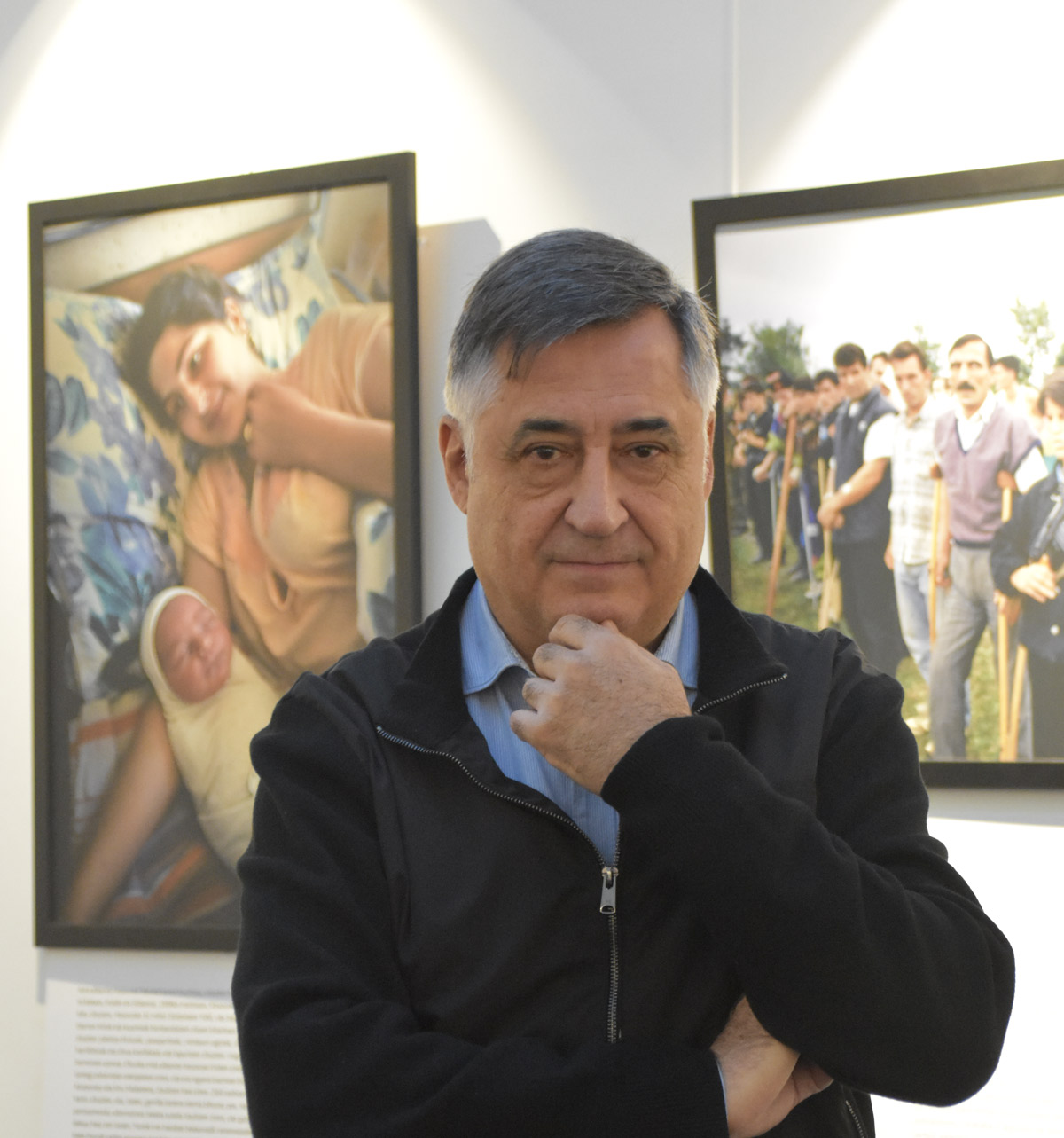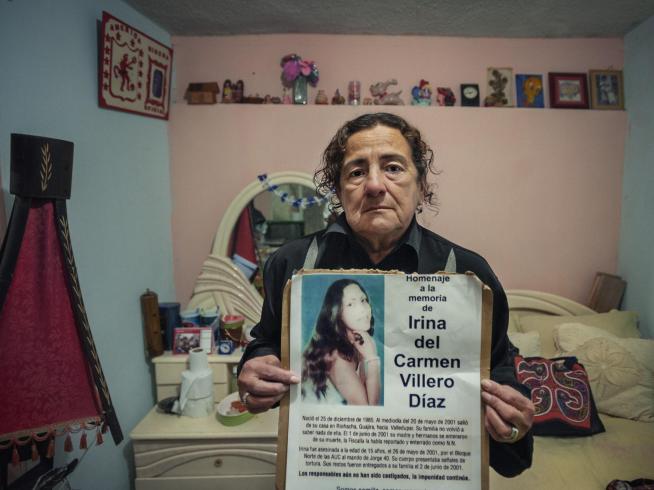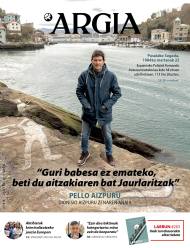"We cannot talk about peace if the authorities finance arms"
- Gervasio Sánchez (Córdoba, Andalusia, 1959) is a veteran photojournalist. He lives in Aragon, Zaragoza, but visits and reports very often on the conflicts and war zones of the world. For the local newspaper Heraldo de Aragón always collaborates with high audience media. It faces the victims hit by the weapons built in our country and maintains the relationship with the many. Violence makes women victims invisible often. Emakumeak. Wars. ("Violence. Women. War. ", Blume, in book 2021). He opened his exhibition in February in Bilbao.

For the past 40 years, it has been in many areas of war and conflict. He brought a collection to the book. These are a lot of photos from different eras and places. Some of them, I think, would be published in the written press, I don't remember very well anymore, and some books would also show up, but there are images that have never come to light. I've tracked all my hard drives and finally picked 90 images. These are photographs taken from a total of 26 conflicts and
wars between 1984 and 2017. I've published specific conflicts, but it's a collection, yes. A collection focused on violence suffered by women.

They are all victims, civilian victims. Most of them look at the camera and enter history through their eyes: behind there are very hard stories. They are all hard, very special and very personal. But we're not going to make comparisons, because I don't like categorizing victims. It is true that there are non-governmental organisations and the media which compare, for example, that women suffer more than men, and even more so children and adolescents. But that's not the case: everyone suffers their own way and pain cannot
be compared. Pain and suffering is what you can't compare at all.
There is another thing: what happens in Afghanistan? They have been at war for 44 years. Since the Soviets invaded the Soviets in 1979 they have not known peace times, and in 2023 the war continues, even if it seems forgotten. So to find someone who knew the era of war, to find someone who knows what it is to live in peace in their country, that person has to be well over 50, and I assure him that that age, in Afghanistan, is very old. People don't live much longer. So what I mean by this is that the child born in the middle of war is 40 years old and still in war. We therefore say again: who suffers the most? Children? Teenagers? Adults? Women? People live their whole lives in war. And even after the war ends, the post-war tends to be worse.

That's for the victims, but what would
you say for those who commit the war? It's not the same thing to be a man as to be a woman in a war. In other words, you will be condemned to wage war or to suffer directly the damage of that war, in general terms. Now, that said, it contradicts me with the previous argument, but it is.
Men do war in general, although there are obviously armed wars between women. And although many say yes, it is not true: women are no less than men in the application of violence. Don’t miss what happened in Abu Ghraib prison in Iraq: torture was mandated by an American military and many torturers were women. Their attitudes were very sadistic: rape and sexual abuse, even of men. Women were the rapists and they applied to the victims what would do the most harm.
Biolentzia. Emakumeak. All the victims you brought to the book Wars are women, talk about their suffering. More than talking about victims, I have brought women victims here, because this is not often talked about. For example, let's talk about enforced disappearances. Most of the missing are
men and, for example, in these photos there are cases of women from Chile, Colombia, Salvador and Guatemala who had disappeared from their partner, spouse, relative or male friend between 1960 and 1990. How many years have you spent and how long have you been looking for?
.jpg)
Is it another model victim? I think it is the main victim. The invisible above all else. Next September is the 50th anniversary of the military coup of Augusto Pinochet in Chile. I know the women, that their partner disappeared a few weeks after Pinochet's coup d'état. Notice, in 1973 they were about 20 years old. They lost their lives, lost their vital project, and talking to them clearly shows that they have not become the ones they were. Many have not been able to become partners again. They
are now over 70 years old and are still looking for the body.
Surely, brutally, these men would have been tortured, they would have been raped, humiliated -- but it doesn't matter: it was a matter of minutes, hours, days or weeks. I'm sure they gave them a shot and they would suffer more or less. Instead, their relatives, their partners ... That said, they have been suffering for 50 years. You don't talk about that.

I have told you here and there that wars do not end the peace agreement. You go into the
Wikipedia and you look, "When did the Balkan war end?" It will tell you in 1995. All right -- so why have I been at the funerals of my friends' family in 2022? Yes, to see, it is true that in 1995 the peace agreement was signed and that the war ended there "officially". But the wounds are there.
"We are exhumane tombs, identifying corpses; the conflict is not over. And notice, it's been over 80 years."
We know them without going any further. 90 years after the Spanish Civil War, when Franco ended the war, he said “we have won.” We are exhumane tombs and identifying bodies; the conflict is not over. We continue to suffer the consequences of war. And yes, look where you look, you'll see that in 1939 the civil war ended. Imagine, it's been over 80 years.
The year has come back since the outbreak of war in Eastern Europe. Let's talk about victims. He said that he does not want to make comparisons or categorizations, but there is a difference between being
Ukrainian or, for example, Syrian. There's no more to see how we've taken some at home. The conflict in Ukraine and the voice of the victims are being closely monitored. We must start from there, that we are in Europe and that the attacker is Russia.
It is true that Ukrainians are easier to leave the country than civilians from any other war. I was on the border between Ukraine and Poland in November, and I saw with my own eyes how the Polish police were beating and throwing back Syrian, Eritrean and Afghan refugees. The Ukrainians, for their part, had opened the way. Do they have the same rights? No, of course. But both are victims.
.jpg)
The wave of refugees has
been very large. I was struck by an issue. Millions of people in Western Ukraine have left the country and nothing catastrophic has happened in this area. I fully understand that I am afraid and want to leave, but instead in Ukraine I have met a lot of people what has been left under the explosion. On the border between Ukraine and Russia, for example, they first received attacks from Russia and then from Ukraine. In other words, those who needed to leave have remained in the midst of the conflict, and those who were better off have left the country. Yes, and always, whoever saves his ass does it for his economic capacity.
"It is clear that the Russian and Ukrainian population are the main losers of war, while on the other side there are people who are making a lot of money"
We have been quoted in Bilbao for the interview. In front of you, tanks and weapons are being sent a few kilometres from here, and nearby parts are being manufactured. In November I was one month on the border between the two countries and the day after returning I was called from the public radio Euskadi for
an interview. The first question was who was winning the war. My answer was that the arms companies of the Basque Country are winning, and are also subsidized by the Basque Government. And on the radio there was a great silence -- (Laughter).
It is clear that the Russian and Ukrainian populations have nothing to gain, they have everything to lose. They will be the main losers and still have a lot to lose, that is the most worrying thing. On the other hand, there are people who are making a lot of money, because at the same time the budgets for state defense are rising. All of this is surely happening because when the Berlin Wall fell things were not done well.

What do you mean? NATO had to redesign it. To his older brother, EE.UU, he had to tell him to stay in his country and turn it into
a military structure equal to Europe, otherwise we always depend on them and act to their interests and orders. What happens is that the military issue is often the main point of discussion in the Member States of the European Union: we do not want wars, we want to be pacifists, we want to respect human rights… And now we are going to multiply military spending today.
In the Spanish state, surprisingly, the “most leftist government of all time” will. Now, for the people of Podemos the topic is taboo and you can't talk. For example, and this has been for a long time, the boats we sell to Saudis and Moroccans are made in Cadiz, in Navalia, Andalusia. We've been sending him to town hall for some time. The mayor doesn't have to say anything? Of course, a company of 5,000 workers jumps on it, and it calms down. So when we're in opposition, we'll make a lot of noise, and when we're in government, we'll eat our principles, right?
"The most left-wing government of all time will multiply military spending today"
What if the right ruled? I have been studying and following the Spanish arms industry for years, and the most surprising thing is that when the Socialists were in government, more weapons have been sold out of all time. In the government of José Luis Rodríguez Zapatero (PSOE), who appeared to
be an apostle against violence, between 2004 and 2011 the sale of weapons was six-fold. Six! Then, of course, Mariano Rajoy (PP) continued to rise, but not at the same speed, slower.
Have we citizens accepted states selling arms? Twenty years ago,
millions of people took to the streets to say “No to War.” Because then was the United States the aggressors? And now no one is going to go out in the street against Russia? Where is the left? In the Spanish State, and even more so in the Basque Country, a sector on the left is very quiet. How?
"In the Spanish state, and more in the Basque Country, a sector on the left is very quiet. How?"
I always say that whoever kills people in a war is guilty, but at least “has done something”, or at least has “homework”; those who bleach the murderer, those who applaud, or those who kill, but those who look elsewhere are also guilty. During Nazism a lot happened in Germany: his Jewish neighbor was driven, but “you didn’t know where.” Please -- because the best actors, writers, film directors or engineers of the time were German. They weren't illiterate and they knew very well what was going on.

The media are also responsible for this, you will say. Public opinion
must be better informed and we are facing
a very serious problem. The media misinform and misinform, there is very little quality and is manipulated in general. We are not doing the work we should do. Many have economic interests. Who is criticising the Basque arms industry here? Four cats. We cannot talk of peace if our president or lehendakari is subsidising weapons, and subsidising is financing. I mean, governments fund war. Civilians die with our money. Who can speak of peace?
Let us return to the focus of the war in Ukraine. NATO member states are sending weapons on a massive scale. Is it becoming an increasingly geopolitical conflict? You would or I would say yes, that the conflict has entered a second part. It's no longer Donbas and it's done. Everything has been internalized. The other day, German Chancellor Olaf Scholz literally said that the war is already
going beyond Ukraine because NATO has completely entered. That is an international war, that is, a world war. I do not want to put the number 3 first, but when the Germans speak clearly.
"Who criticizes the Basque arms industry here? Four cat."
At the base the Russians have made a mess, they have led the situation to chaos. Respect for local conflicts, but at the end of the day they invade a country that was not their own, and they decide to increase the pace by 2022. 2023 also looks like this, bad. What needs to be done is to agree on an appropriate solution. The Russians will demand a dignified solution, as they will not come home down their heads. But the Ukrainian Government wants war, Zelensky wants war. And he wants to involve NATO, so far he has succeeded.
Finally, he asks, who will win the war? (Laughter) I told you earlier who. In addition, the least involved always win. The Americans are
very comfortable economically, strategically, logistically, politically and militarily. Both the war and the sanctions imposed on Russia are deeply punishing one of their greatest enemies. They also have oil, gas, price control capacity in international markets -- everything. They are very well placed and you will have to see what China is doing on the other side. It is a question of geopolitics, but returning to Earth, what I said earlier: the Ukrainian people still have a lot to lose, even the Russians.
Vietnam, February 7, 1965. The U.S. Air Force first used napalma against the civilian population. It was not the first time that gelatinous gasoline was used. It began to be launched with bombs during World War II and, in Vietnam itself, it was used during the Indochina War in... [+]
It's not a new thing, the world that Homo omen sapiens explodes is getting smaller and smaller. Four holiday and even Scandinavia, thanks to kerosene without taxes. Otherwise, the good Basque will choose exotic places for his holiday. In this magazine, in March, Pello Zubiria... [+]
























